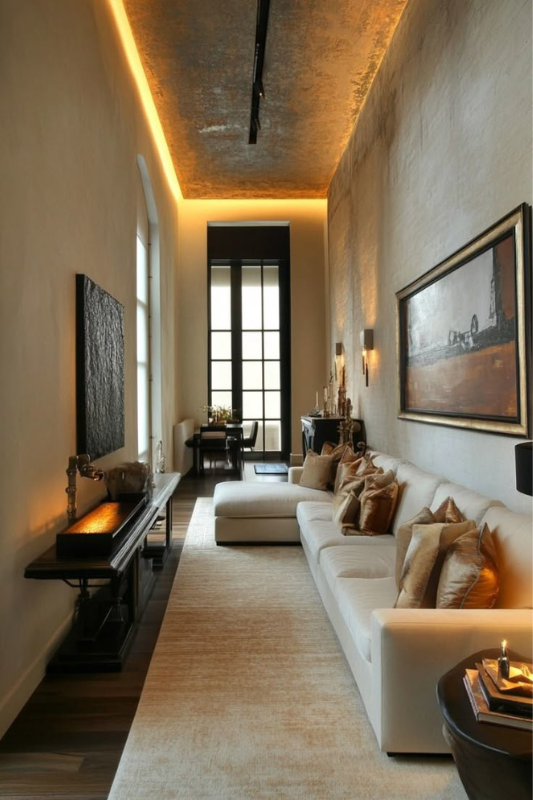As small space living continues to trend in cities and suburbs alike, the challenge of furnishing a narrow living room has never been more relevant. Whether you’re working with a long, narrow apartment or a slim living space in a modern home, achieving the perfect layout can feel like solving a design puzzle. Fortunately, a few smart layout tricks and the right furniture choices can transform your tight space into a functional and stylish haven.
In 2025, the demand for small living room ideas, space-saving furniture, and apartment living hacks is stronger than ever. People are embracing the cozy charm of compact interiors, but still want their rooms to feel open, balanced, and livable. This is where layout, flow, and smart design elements make all the difference.

From choosing the best sofa for small spaces to layering with multi-functional furniture, this guide walks you through 15 professional strategies that will help you arrange furniture in a narrow living room like a pro. The focus is on blending functionality with comfort, while keeping your space airy, inviting, and stylish.
Whether you’re working with a rental living room, studio apartment, or simply looking to refresh your current setup, these tips are designed to inspire you. No renovations required, just a few well-placed pieces and a fresh perspective on layout.
Key Tips Before Rearranging Your Narrow Living Room
Before you start moving furniture around or shopping for new pieces, take time to map out your space. These professional layout tips are essential when working with a slim or awkward floor plan:
Measure your space: Note the room’s length, width, and ceiling height. This helps you select properly scaled furniture and avoid overcrowding.
Plan your layout on paper first: Sketch your furniture or use free online room planners to visualize before moving anything.
Create a focal point: Choose one like a TV, fireplace, or statement wall, to anchor your layout and guide the furniture flow.
Think in zones: In longer spaces, divide the room visually into seating, reading, or dining areas using rugs or furniture placement.
How To Arrange Furniture in a Narrow Living Room
Narrow living room layout examples:
- 10×12 layout (a small living room)
- 7×10 layout (tiny living room)
- 6×12 layout (narrow living room)
Layout example of a tiny and narrow living room:

1. Choose a Slim, Streamlined Sofa
When working with limited width, a traditional oversized couch can completely overwhelm your space. Instead, look for a slim sofa or apartment-sized loveseat with narrow arms and a low back. These styles offer comfort without bulk. Prioritize clean lines and exposed legs, which visually lift the furniture off the floor, making your room appear more open.

Soft neutral upholstery helps the piece blend seamlessly into the walls, enhancing the illusion of space. Don’t forget to check for modular sofas, they allow you to customize shapes around your layout.
2. Define the Area With a Long, Narrow Rug
A well-placed area rug helps zone your layout and gives structure to the seating area. In a narrow living room, a long runner or a rectangular low-pile rug will visually stretch the room, guiding the eye from one end to the other.

Choose a subtle pattern or neutral tone to avoid visual clutter. Ideally, the rug should be wide enough to sit under the front legs of your sofa and any chairs, anchoring the furniture in place.
3. Float the Sofa to Separate Zones
Rather than pushing everything against the wall, create space by floating your sofa a few feet away from one wall. Behind it, place a console table to define the boundary between zones, this works particularly well in an open-plan or long rectangular space.

The console table can double as a place for lamps, books, or decorative trays, offering both form and function without blocking visual flow.
4. Add a Storage Ottoman or Bench
Multi-purpose furniture is key in narrow rooms. A storage ottoman or tufted bench serves as a coffee table, extra seating, and hidden storage. Choose one with a lift-top lid or internal compartments to stash blankets, games, or magazines.

Soft materials like velvet or woven linen add texture, while light tones maintain visual spaciousness. These are great alternatives to traditional coffee tables.
5. Swap the Coffee Table for Nesting Tables
Instead of a single bulky coffee table, consider using nesting tables or a pair of compact accent tables. They offer greater flexibility—use one when entertaining or split them apart for different zones. Opt for round or oval shapes that ease movement through the room.

Choose styles in metal, glass, or light-toned wood for a lighter feel that blends rather than blocks.
6. Go Armless With Extra Chairs
Add seating without cluttering the room by choosing armless accent chair. These keep sightlines open and make tight spaces feel less boxed in. Lightweight linen or velvet or even faux leather chairs in soft shades work well here.

Consider options that can be easily moved or stowed, such as folding chairs or slim armchairs that tuck neatly into corners or next to windows.
7. Use Mirrors to Expand the Room
Mirrors are one of the oldest and most reliable tricks for small spaces. A large mirror—especially one with a decorative frame can reflect both light and space, giving the impression of a room twice its size.

Place a statement mirror above your sofa, near the entryway, or across from a window to reflect natural light throughout the room. Styles with antique finishes or minimal metal frames work well for different decor themes.
8. Install Floating Shelves Instead of Bookcases
Avoid boxy bookcases that eat up floor area. Instead, install floating wall shelves above seating areas or along unused vertical space. This keeps things airy while offering places to display books, plants, photo frames, or ceramics.

Choose wooden, metal, or even glass shelves that suit your aesthetic and allow decorative layering without clutter.
9. Maximize Vertical Space With Tall Storage
In narrow rooms, every inch counts. Go upward with tall vertical bookcases, armoires, or display cabinets. These use ceiling height to provide storage while keeping the floor clear. Stick to narrow units under 24 inches wide that still offer multiple shelves or drawers.

For a cohesive look, match them to your console table or media stand in color or material.
10. Keep a Clear Walking Path
Even the best furniture arrangement falls flat if the room feels hard to walk through. Keep at least 30 inches of clear space between large pieces. Avoid wide sideboards or chunky end tables instead, choose corner shelves or compact accent pieces that can hug the wall and serve their purpose without blocking movement. A good layout feels breathable and intuitive.

11. Mount the TV on the Wall
Free up floor space by wall-mounting your TV with a secure bracket. This eliminates the need for a bulky TV stand and visually declutters your space. Add a floating shelf or small media ledge underneath to house remotes, streaming boxes, or small decor.

For minimalist rooms, choose low-profile mounts that sit close to the wall.
12. Layer Your Lighting
In narrow rooms, overhead lights alone can create harsh shadows. Add dimension by layering floor lamps, wall sconces, and table lamps around your seating area. These create cozy pockets of light and make your space feel inviting.

Look for LED floor lamps with dimmers, plug-in sconces, and compact table lamps for side tables or shelves. Go for neutral or matte finishes to keep your palette cohesive.
13. Create a Window Nook or Daybed Space
Turn a window corner into a functional and charming reading nook with a window bench or daybed. These pieces double as lounge space or guest beds and often come with built-in drawers or lift-up lids for extra storage.

Style them with cushions, throws, and a nearby side table for tea, books, or plants. Choose light woods or white-painted frames to keep it fresh and open.
14. Divide the Room With Curtains or Folding Screens
If your narrow room doubles as a multi-use space like living room + office use a folding screen or ceiling-mounted curtain to divide it. This creates privacy without building walls. Opt for fabric screens in linen or cotton for softness, or wooden paneled screens to add a rustic or boho vibe.

When not in use, just fold them away or tie them back to open the space again.
15. Stick to Light Colors and Natural Textures
The easiest way to make a narrow room feel bigger is to decorate with light-colored fabrics, pale woods, and natural textures. Think rattan light fixtures, cotton slipcovers, cotton throws, and oak or birch furniture.

These elements reflect more light and add depth without visual clutter. Finish off with sheer curtains, muted wall art, and soft neutral tones throughout your palette.

